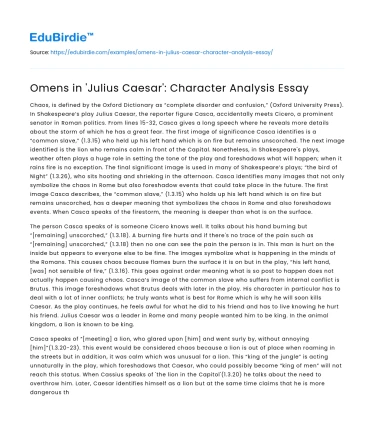Chaos, is defined by the Oxford Dictionary as “complete disorder and confusion,” (Oxford University Press). In Shakespeare’s play Julius Caesar, the reporter figure Casca, accidentally meets Cicero, a prominent senator in Roman politics. From lines 15-32, Casca gives a long speech where he reveals more details about the storm of which he has a great fear. The first image of significance Casca identifies is a “common slave,” (1.3.15) who held up his left hand which is on fire but remains unscorched. The next image identified is the lion who remains calm in front of the Capital. Nonetheless, in Shakespeare's plays, weather often plays a huge role in setting the tone of the play and foreshadows what will happen; when it rains fire is no exception. The final significant image is used in many of Shakespeare’s plays; “the bird of Night” (1.3.26), who sits hooting and shrieking in the afternoon. Casca identifies many images that not only symbolize the chaos in Rome but also foreshadow events that could take place in the future. The first image Casca describes, the “common slave,” (1.3.15) who holds up his left hand which is on fire but remains unscorched, has a deeper meaning that symbolizes the chaos in Rome and also foreshadows events. When Casca speaks of the firestorm, the meaning is deeper than what is on the surface.
The person Casca speaks of is someone Cicero knows well. It talks about his hand burning but “[remaining] unscorched,” (1.3.18). A burning fire hurts and if there's no trace of the pain such as “[remaining] unscorched,” (1.3.18) then no one can see the pain the person is in. This man is hurt on the inside but appears to everyone else to be fine. The images symbolize what is happening in the minds of the Romans. This causes chaos because flames burn the surface it is on but in the play, “his left hand, [was] not sensible of fire,” (1.3.16). This goes against order meaning what is so post to happen does not actually happen causing chaos. Casca’s image of the common slave who suffers from internal conflict is Brutus. This image foreshadows what Brutus deals with later in the play. His character in particular has to deal with a lot of inner conflicts; he truly wants what is best for Rome which is why he will soon kills Caesar. As the play continues, he feels awful for what he did to his friend and has to live knowing he hurt his friend. Julius Caesar was a leader in Rome and many people wanted him to be king. In the animal kingdom, a lion is known to be king.
Save your time!
We can take care of your essay
- Proper editing and formatting
- Free revision, title page, and bibliography
- Flexible prices and money-back guarantee
Casca speaks of “[meeting] a lion, who glared upon [him] and went surly by, without annoying [him]”(1.3.20-23). This event would be considered chaos because a lion is out of place when roaming in the streets but in addition, it was calm which was unusual for a lion. This “king of the jungle” is acting unnaturally in the play, which foreshadows that Caesar, who could possibly become “king of men” will not reach this status. When Cassius speaks of 'the lion in the Capitol'(1.3.20) he talks about the need to overthrow him. Later, Caesar identifies himself as a lion but at the same time claims that he is more dangerous than danger itself when he says: 'We are two lions litter in one day, And I the elder and more terrible' (2.2.46-47). This goes to show the image of 'the lion in the Capitol'(1.3.20) foreshadows the conspirators overthrowing him not letting him become the “king of men” which causes chaos in Rome. Shakespeare often uses weather in his tragedies, such as when there's lightning and thunder, to foreshadow that something bad is about to happen. In Casa’s speech, he speaks of a large storm with lots of wind and angry clouds causing the earth to shake and “tempest-dropping fire” (I.III. 10) meaning it was raining fire. Casa explains he has never seen anything like it which means it is “complete disorder and confusion”(Oxford University Press). When Cassius hears this, he knows it is a warning that something bad is coming: 'Either there is a civil strife in heaven, / or else the world, too saucy with the gods, / Incenses them to send destruction' (I.III.11-13). This goes to show omens can be interpreted differently depending on what you want them to mean.
One interpretation that Cassius had was it was a warning for the Romans about Caesar's 'monstrous state' of tyranny in Rome (I.III.73-74). This is why they had to continue to plot his murder. This omen ends up foreshadowing the civil war that is a result of Caesar's death. Cassius says that the bad omens mean trouble for Julius Caesar. “The bird of night” (1.3.26), who sits hooting and shrieking in the afternoon is yet another omen that points to Caesar's death in the play. The fact the bird of night is out in the afternoon is the first sign of chaos but it is not just sitting there quietly, instead, it is hooting and shrieking. Birds are another image that Shakespeare often uses to warn the audience to prepare themself for a tragedy. In Casca’s speech, many images point to chaos in Rome but also foreshadow events such as Caesar's death and the outcome of it. The common slave who is suffering, the animals: lions and birds, and the weather all have an effect on foreshadowing events that are yet to come.






 Stuck on your essay?
Stuck on your essay?

